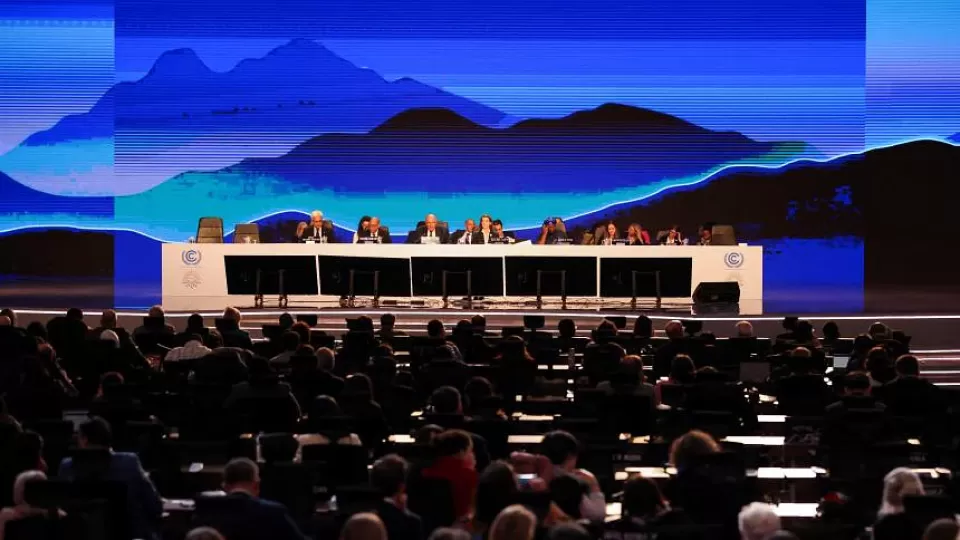November 21, 2022
SHARM EL-SHEIKH, Egypt – The COP27 climate talks on Sunday achieved a hard-fought agreement to create a fund to help developing nations cope with spiralling loss and damage from climate impacts.
But the deal, agreed after two weeks of intense negotiations in the Egyptian resort of Sharm El-Sheikh, was criticised for failing to push for tougher action to phase out fossil fuels, the main source of emissions driving the global climate crisis and a key threat to limiting global warming to 1.5 deg C above pre-industrial levels.
After running nearly 36 hours overtime, delegates from nearly 200 nations agreed on the Sharm El-Sheikh Implementation Plan, a 12-page political document setting out a broad range of actions on climate change.
“Our planet is still in the emergency room,” United Nations Secretary-General Antonio Guterres said in reaction to the deal.
“We need to drastically reduce emissions now – and this is an issue this COP did not address,” he said, adding that while a fund for loss and damage was essential, “it’s not an answer if the climate crisis washes a small island state off the map – or turns an entire African country to desert”.
He said the world still needed a giant leap on climate ambition. “Doubling down on fossil fuels is double trouble.”
Developing nations have been pushing for decades for a deal to pay for irreparable loss and damage from climate impacts.
The fund, related financial arrangements and structure will take shape over the coming year, led by a specially appointed committee. The aim is to agree the outlines of the fund and sources of financing by the next major UN climate gathering – COP28 – in the United Arab Emirates in late 2023.
Progress was also made in discussions to create a global goal on adaptation, another key area for developing nations which need growing amounts of assistance to boost their resilience to worsening storms, floods, droughts and sea-level rise. For instance, investments to strengthen infrastructure such as drainage and sea walls or boosting the resilience of agriculture to hotter and more unpredictable weather.
An initial four-year work programme has been launched to encourage more ambition by all nations to cut emissions through workshops, knowledge sharing and financial investment events. But it does not set firm targets, nor is it punitive.
But it was the loss and damage fund decision, which many thought would not be agreed, that brought the most praise.
This is because the idea of a fund had long been resisted by the United States and a number of other rich nations, fearing it would lead to compensation payments. Wealthy nations are historically responsible for the majority of the greenhouse gas pollution that is heating up the planet and triggering increasingly extreme weather events.
“This loss and damage fund will be a lifeline for poor families whose houses are destroyed, farmers whose fields are ruined, and islanders forced from their ancestral homes. This positive outcome from COP27 is an important step toward rebuilding trust with vulnerable countries,” said Mr Ani Dasgupta, president and chief executive of the Washington-based World Resources Institute think-tank.
The deal also aims to broaden the pool of financing sources for loss and damage and encourages multilateral development banks, such as the World Bank, to do more to help.
“A mission 30 years in the making has been accomplished,” said Mr Molwyn Joseph, chair of the Alliance of Small Island States, of which Singapore is a member.
Mr Yeb Sano, executive director at Greenpeace South-east Asia, told The Straits Times: “The agreement for a loss and damage fund marks a new dawn for climate justice.
“This provides a glimmer of hope for the vulnerable communities in South-east Asia which are already experiencing destructive storms, massive floods, rising sea levels, forest fires, droughts.”
But there was deep disappointment on the final wording around fossil fuels and ambition to ramp up global action to cut greenhouse gas emissions. The text maintains the same compromise language of 2021’s Glasgow Climate Pact of phasing down unabated coal and phasing-out of inefficient fossil fuel subsidies. Unabated means the carbon emissions are not captured. The text does not mention oil or gas, only coal.
The European Union had pushed hard, along with many climate-vulnerable nations, for a call to phase out all fossil fuels, place a stronger emphasis on the need to ramp up renewable energy investments and for nations to submit more ambitious climate action plans to the UN.
The EU’s climate policy chief Frans Timmermans told the conference on Sunday the deal was not strong enough. “This is the make or break decade, but what we have in front of us is not enough of a step forward for people and planet.”
“It does not bring enough added efforts for major emitters to increase and accelerate their emissions cuts,” he added.
Ms Laurence Tubiana, CEO of the European Climate Foundation, and a key figure in the creation of the 2015 Paris climate agreement, said: “The influence of the fossil-fuel industry was found across the board. This COP has weakened requirements around countries making new and more ambitious commitments.
“The Egyptian Presidency has produced a text that clearly protects oil and gas petro-states and the fossil-fuel industries. This trend cannot continue in the United Arab Emirates next year.”
The pact did recognise the importance of protecting, conserving and restoring nature and ecosystems as a vital way to limit global warming to 1.5 deg C above pre-industrial levels, a key goal of the Paris Agreement.
The link to nature is essential, especially ahead of December’s UN biodiversity summit, COP15, being held in Montreal, which is tasked with setting much more ambitious targets to save nature by 2030, the UN said.


